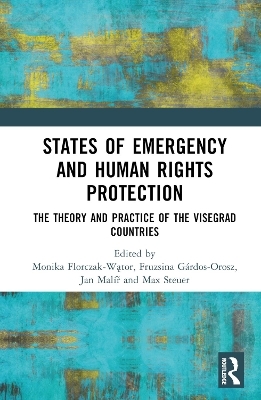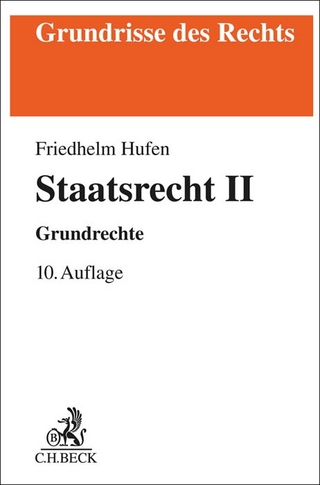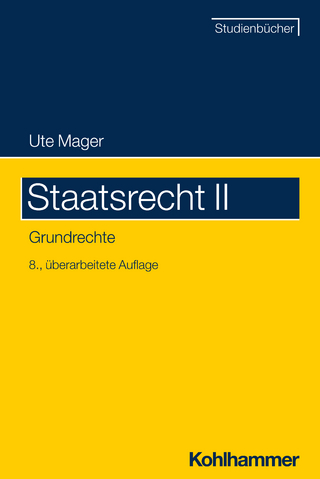
States of Emergency and Human Rights Protection
Routledge (Verlag)
978-1-032-63745-7 (ISBN)
Emergencies are ubiquitous in 21st-century societal discourses. From the rise of emergency pronouncements in the United States since 9/11 accompanied by the associated violations of fundamental rights, through talks of ‘crises’ in the EU in relation to the economy, Putin’s occupation of Crimea (as recently amplified by the full-scale invasion of Ukraine) or refugees, to the long-neglected looming climate catastrophe, emergency discourses have been catapulted to the centre of attention by the critical juncture of the COVID-19 pandemic.
This volume presents and compares the existing regulations and practices of emergencies and human rights protection in the Visegrad (V4) countries. As such, the analysis covers Czech Republic, Hungary, Poland, and Slovakia. Although these European countries share a common historical experience and are now members of the EU and NATO, they differ in some of their constitutional traditions and, also, in the dynamics of their political regimes. Divided into three parts, the first two comprehensively discuss the constitutional models of emergency and human rights protection in each of the V4 countries, while the third part illustrates how these models and the general framework of rights protection materialised in the limitations of the selected human rights during the COVID-19 pandemic.
The volume provides a compass for more in-depth, comparative, and interdisciplinary inquiries into the forms and practices of emergencies in one of the EU regions that faces illiberalisation and the consequences of the ongoing invasion of Ukraine by the Russian Federation on its eastern borders. It will be a valuable resource for academics, researchers, and policymakers working in the areas of Constitutional Law and Politics.
Monika Florczak-Wątor is Professor in the Constitutional Law Department of Jagiellonian University, Director of the Centre for Interdisciplinary Constitutional Studies of Jagiellonian University, and Director of the Interdisciplinary PhD programme ‘Society of the Future’ at the Jagiellonian University Doctoral School in Social Sciences, Poland. Fruzsina Gárdos-Orosz is Director and Research Professor of the Institute for Legal Studies, HUN-REN Centre for Social Sciences, Budapest and also Professor in Constitutional Law at the ELTE Law School, Hungary. Jan Malíř is Research Fellow at the Institute of State and Law of the Czech Academy of Sciences. He is also a member of the Commission for EU Law at the Legislative Council of the Cabinet, an advisory body to the Czech Cabinet (Prague), the Steering Committee of the Centre francais de recherche en sciences sociales (CEFRES, Prague) and of the PhD Advisory Committee at the Charles University Faculty of Law, Prague, Czech Republic. Max Steuer is Associate Professor at O.P. Jindal Global University, Jindal Global Law School, India, and Assistant Professor at Comenius University in Bratislava, Department of Political Science, Slovakia.
States of emergency and fundamental rights in books and in actions: the Visegrad countries and the COVID-19 pandemic; Part I: Models of states of emergency in Visegrad countries; 1. States of emergency and COVID-19: Czech Republic; 2. States of emergency in Hungary; 3. States of emergency in Poland: A model under construction?; 4. Models of states of emergency in Slovakia and their political context: “We’ll manage…somehow?”; Part II: Models of human rights protection in Visegrad countries; 5. Fundamental rights limitations in states of emergency: The Czech pattern; 6. The normative standards of human rights protection in normalcy and in emergency in Hungary; 7. Human rights in states of emergency: Constitutional principles and their application in the Republic of Poland; 8. A widening gap? Fundamental rights and states of emergency in Slovakia; Part III: Restrictions on human rights in times of COVID-19 pandemic; 9. Emergency as a pretext for restricting political rights – the Hungarian autocratic regime at work; 10. Restrictions on the freedom of assembly: The case of Poland; 11. Disproportionate restrictions on the freedom of movement: The Slovak Republic during the COVID-19 pandemic; 12. Restrictions imposed on the right to education in the Czech Republic due to COVID-19 pandemic; 13. Restrictions on the right to a fair trial in Poland during the COVID-19 pandemic
| Erscheinungsdatum | 15.02.2024 |
|---|---|
| Zusatzinfo | 3 Tables, black and white; 2 Line drawings, black and white; 2 Illustrations, black and white |
| Verlagsort | London |
| Sprache | englisch |
| Maße | 156 x 234 mm |
| Gewicht | 453 g |
| Themenwelt | Geisteswissenschaften ► Philosophie |
| Recht / Steuern ► Allgemeines / Lexika | |
| Recht / Steuern ► EU / Internationales Recht | |
| Recht / Steuern ► Öffentliches Recht ► Verfassungsrecht | |
| Sozialwissenschaften ► Soziologie ► Spezielle Soziologien | |
| ISBN-10 | 1-032-63745-5 / 1032637455 |
| ISBN-13 | 978-1-032-63745-7 / 9781032637457 |
| Zustand | Neuware |
| Informationen gemäß Produktsicherheitsverordnung (GPSR) | |
| Haben Sie eine Frage zum Produkt? |
aus dem Bereich


